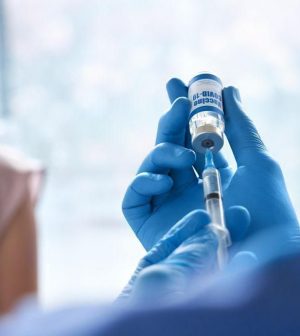- 10 Strategies to Overcome Insomnia
- Could Artificial Sweeteners Be Aging the Brain Faster?
- Techniques for Soothing Your Nervous System
- Does the Water in Your House Smell Funny? Here’s Why
- Can a Daily Dose of Apple Cider Vinegar Actually Aid Weight Loss?
- 6 Health Beverages That Can Actually Spike Your Blood Sugar
- Treatment Options for Social Anxiety Disorder
- Understanding the Connection Between Anxiety and Depression
- How Daily Prunes Can Influence Cholesterol and Inflammation
- When to Take B12 for Better Absorption and Energy
Immunocompromised May Need Fourth COVID Shot: CDC

Severely immunocompromised people may require a fourth mRNA coronavirus shot, the U.S. Centers for Disease Control and Prevention says.
The agency didn’t provide an official recommendation about a fourth shot in its updated guidelines, but did say that people should talk to their doctors to determine if one is necessary, CNN reported.
In August, the CDC authorized a third dose for certain immunocompromised people 18 and older who may not have a complete immune response from the first two doses.
The U.S. Food and Drug Administration has approved booster shots of all three available vaccines in the United States for certain people, including those with compromised immune systems.
According to the CDC, small studies have found that fully vaccinated immunocompromised people accounted for about 44% of the breakthrough cases that led to hospitalization. And one Johns Hopkins University study found that vaccinated immunocompromised people were 485 times more likely than most vaccinated people to be hospitalized with COVID-19 or die from the disease, CNN reported.
Research shows that a booster shot improves the antibody response to the vaccine in certain immunocompromised people.
Moderately to severely immunocompromised people include those who are being treated for cancers of the blood or for tumors, certain organ transplant and stem cell recipients, people with advanced or untreated HIV, and those who take a high-dose corticosteroids or other drugs that may suppress their immune systems, according to the CDC.
The CDC estimates about 9 million Americans, or roughly 2% of the population, fall into this category.
People who are immunocompromised who got the single-dose Johnson & Johnson shot should get a booster at least two months after their initial vaccine. People who choose a Moderna vaccine as a booster, even if they received a different vaccine as the first dose, should get the half-dose sized shot that was authorized as a booster for Moderna’s vaccine, the CDC said in its recommendations.
Even if they are vaccinated, the CDC recommends people with conditions that compromise their immune systems should still try to avoid crowds and poorly ventilated spaces, and should wear a mask in indoor public spaces.
More information
Visit the U.S. Food and Drug Administration for more on COVID vaccines.
SOURCE: CNN
Source: HealthDay
Copyright © 2026 HealthDay. All rights reserved.










